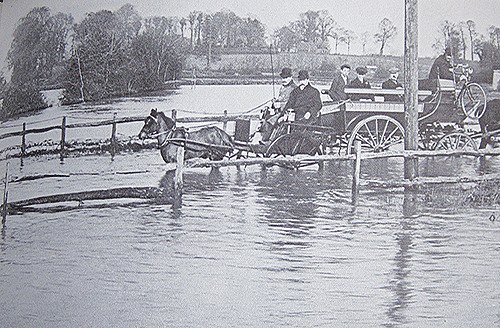Rain, Rain Go Away
Monday 1st July We have been bemoaning the dreadful weather of recent months; but it is not a new phenomenon. In the past the success or failure of the harvest was crucial to the livelihood of any community grounded in farming – such as that of Steyning. If bad weather led to dire harvests, people had something to say.
We have been bemoaning the dreadful weather of recent months; but it is not a new phenomenon. In the past the success or failure of the harvest was crucial to the livelihood of any community grounded in farming – such as that of Steyning. If bad weather led to dire harvests, people had something to say.At harvest time in 1630, for instance, Archbishop Laud noted in his diary that the winter before 'was extreme wet, and scarce one week of frost. This harvest scarce; a great dearth in France, England, and the Low countries.' Within the Rape of Bramber the average price of wheat had been 32s. a quarter; but it jumped up after the bad harvest to 64s. Nearer the Downs people lived largely on barley bread, and that too rose in price from 16s. to 40s. a quarter.
The authorities attempted to ameliorate the impact of these price rises. The magistrates encouraged subscriptions to a common stock for the purchase of corn to supply the different parishes; employing 'Badgers' to buy it and re-sell it to the poor at ls. a bushel (i.e. 8 shillings per quarter) less than it had cost. They also compelled farmers to sell in public markets at hours convenient to the poor and restricted the amount of barley that was syphoned off for malting for use in beer making.
Meanwhile, because prices were yet higher in Surrey and in London, supplies were diverted from Sussex and stocks were depleted. There was yet further depletion when the government bought substantial quantities of wheat for the navy; on two occasions in 1638 there was only one sack of corn remaining for sale at Steyning’s weekly market and Sir John Leedes had to step in to bar any further stocks being shipped out from Shoreham.
On the other hand, particularly bountiful harvests could lead to damagingly low prices as it did in 1618. The government, in the name of the king, intervened saying that there was 'such plenty and store of corn, as that the price thereof is become so small and low, as tend greatly to the impoverishing as well of the farmers as the owners of such land as consisteth of tillage and grain' and that 'many farmers have been forced, these two last precedent years, through the extraordinary cheapnes of corn, to leave their farms'. They added that 'At Michaelmas time poore men must make monie of their graine, that they may paie their rents'. It was a time when substantial farmers such as the Parson’s of Steyning could afford to ride out the fluctuations of the market place and add to their land holding, as small farmers faltered.
Meanwhile the poorest in society had to make do 'with bread made either of beans, peson, or otes, or of altogither [and some acornes among].'
Faced with a glut of grain and low prices the magistrates were instructed to take some of the stocks of grain out of the marketplace by finding 'some fitt place within that county, where a magazine may best be provided for the keeping and stoaring of some reasonable quantity of corn'. How effective this was is doubtful because just two years later, following a disastrously wet summer in 1620, there was anxious scratching around to discover 'what provisions and stores of corn, as well old as that of the last year's growth' there were in the county.
There were yet more terrible harvests between 1646 and 1648. Great discontent with the parliamentary administration of the situation bubbled to the surface in the form of protest groups known as ‘clubmen’. There was such support for these demonstrators, who massed around Horsham and Pulborough, that a Steyning correspondent was prompted to write 'Wee feare that we shall be imbroiled in blood in this county'.
It didn’t come to that, but troops had to be deployed to keep things under control.
Article by: Chris Tod - Steyning Museum.